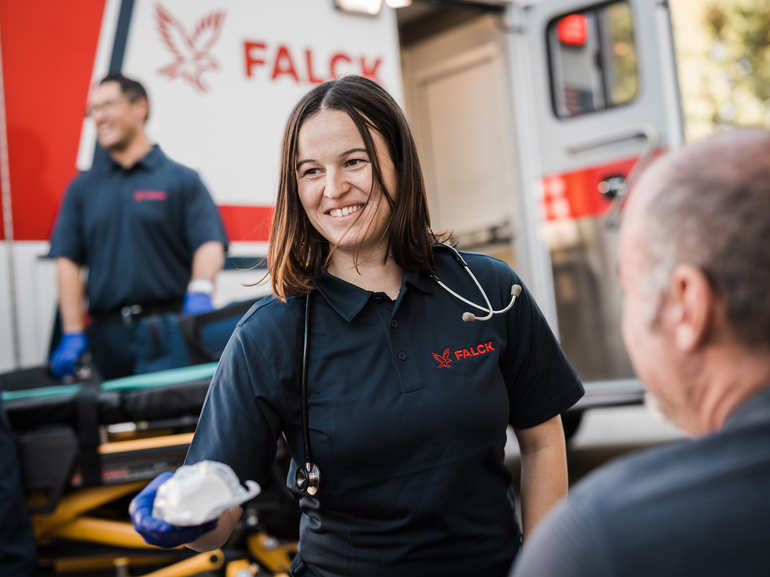The demand for healthcare services is increasing due to societal megatrends like ageing populations and more individuals living with chronic medical conditions. In parallel, accelerating climate change is intensifying the demand for emergency care, necessitating more resilient response systems and a robust healthcare sector overall. With 2024 marking the warmest year on record the urgency to accelerate sustainable healthcare solutions and transition away from fossil fuels is more pressing than ever (source). The healthcare sector is responsible for 4-5% of global CO2 emissions (source).
Falck has committed to substantially reducing their CO2 emissions (scope 1, 2, and 3), while continuing to advance access to healthcare and improve essential life-saving services.
Caring for more patients while improving environmental impact
Falck has a wide range of initiatives to reduce emissions. This includes investing in transitioning as many as possible of its 4,000-vehicle fleet to electric models and collaborating with subcontractors to promote practices with lower climate impact, leveraging contracts and partnerships to facilitate this shift.
Falck's efforts are not limited to reducing emissions from existing services, the company is actively investing in the advancement of home healthcare solutions, expanding telemedicine, and implementing preventive measures. These initiatives aim to increase access to healthcare and build more resilient and sustainable healthcare systems by preventing acute situations.
"As the demand for healthcare continues to rise, it is crucial that we transform our healthcare systems to meet this demand and enhance access to care, while reducing our climate impact. Achieving this requires collaboration across the entire healthcare system. Together, we must rethink how healthcare is delivered, both utilising the full potential of telemedicine, as well as preventing frequent hospitalisations of multi-chronic patients. This benefits patients, the climate, and it will reduce the pressure on the healthcare systems,"
says Jakob Riis, CEO of Falck.
With a diverse array of services that supplement and support healthcare systems, Falck delivers more than 9 million services annually across Europe, the USA, and Latin America. These services include a range of preventive, acute, and rehabilitative care. Each service is designed to advance health or assist those in need, but each service also generates greenhouse gas emissions in various ways.
Falck's approved targets
Falck committed to the Science Based Targets initiative (SBTi) in 2022, with an ambition to align with the global efforts to combat climate change and its effects as outlined in the 2015 Paris Agreement. Falck's near-term (10-year) goals to reduce greenhouse gas (GHG) emissions have now been approved by the SBTI, and Falck commits to:
- 50.4% absolute reduction of scope 1 GHG emissions by 2032 from a 2022 base year
- 50.4% absolute reduction of scope 2 GHG emissions by 2032 from a 2022 base year
- 30% absolute reduction of scope 3 GHG emissions by 2032 from a 2022 base year
Scope 1 is primarily from mobile combustion emissions, such as those from driving ambulances. This accounts for around 25% of the total emissions. Scope 2 is mostly from electricity used at our facilities, equalling 4%. The remaining 71% is scope 3, which covers all other emissions that Falck is responsible for, including bought products and services and their customer emissions.
Advancing sustainable healthcare requires a close collaboration across the entire healthcare sector. With a typical ambulance as an example – local health authorities decide what kind of vehicle it should be and what equipment should be present. The ambulances travel between Falck facilities, hospitals, and incidents. And hundreds of different suppliers produce products used in the ambulances – all with specific demands and requirements – meaning that everyone plays a role in driving the change towards more sustainable healthcare systems.
About the Science Based Targets initiative (SBTi); a collaboration among the Carbon Disclosure Project (CDP), United Nations Global Compact, World Resources Institute (WRI), and World Wide Fund for Nature (WWF), provides a clear pathway for businesses to reduce emissions.



